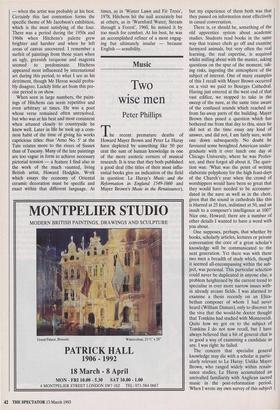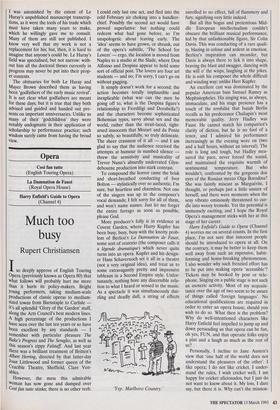Music
Two wise men
Peter Phillips
The recent premature deaths of Howard Mayer Brown and Peter Le Huray have depleted by something like 50 per cent the sum of human knowledge in one of the more esoteric corners of musical research. It is true that they both published a good deal (the titles of their most influ- ential books give an indication of the field in question: Le Huray's Music and the Reformation in England 1549-1660 and Mayer Brown's Music in the Renaissance), but my experience of them both was that they passed on information most effectively in casual conversation.
There is, or should be, something of the old apprentice system about academic studies. Students read books in the same way that trainee chefs go off and examine farmyard animals, but very often the real learning, the real expertise, is acquired whilst milling about with the master, asking questions on the spur of the moment, tak- ing risks, ingesting the atmosphere of the subject of interest. One of many examples of this I recall with Mayer Brown occurred on a visit we paid to Bourges Cathedral. Having just entered at the west end of that vast edifice, we stopped to take in the sweep of the nave, at the same time aware of the confused sounds which reached us from far-away parts of the building. Mayer Brown then posed a question which has bothered me from that day to this, since he did not at the time essay any kind of answer, and did not, I am fairly sure, write one down subsequently. No doubt he favoured some benighted American under- graduate with it over lunch one day at Chicago University, where he was Profes- sor, and then forgot all about it. The ques- tion was: 'What was the point of writing elaborate polyphony for the high feast-days of the Church's year when the crowd of worshippers would have been so great that they would have needed to be accommo- dated in the nave as well as in the choir, given that the sound in cathedrals like this is blurred at 25 feet, indistinct at 50, and an insult to a composer's intelligence at 100?' Nice one, Howard; there are a number of other details I wanted to have a word with you about.
One supposes, perhaps, that whether by books, scholarly articles, lectures or private conversation the core of a great scholar's knowledge will be communicated to the next generation. Yet there was with these two men a breadth of study which, though it seemed all-encompassing within the sub- ject, was personal. This particular selection could never be duplicated in anyone else, a problem heightened by the current trend to specialise in ever more narrow issues with- in already arcane fields. I was alarmed to examine a thesis recently on an Eliza- bethan composer of whom I had never heard (William Daman), only to discover in the viva that the would-be doctor thought that Tomkins had studied with Monteverdi. Quite how we got on to the subject of Toinkins I do not now recall, but I have always believed that a bit of general chat is as good a way of examining a candidate as any. I was right: he failed.
The concern that specialist general knowledge may die with a scholar is partic- ularly relevant to Le Huray. Unlike Mayer Brown, who ranged widely within renais- sance studies, Le Huray accumulated an unrivalled familiarity with Anglican sacred music in the post-reformation period. When I wrote my own survey of this subject I was astonished by the extent of Le Huray's unpublished manuscript transcrip- tions, as it were the tools of his trade which must have taken many years to make, which he willingly gave me to consult. Many of them are still not published. I know very well that my work is not a replacement for his; but, then, it is hard to imagine that anyone's could be. Le Huray's field was specialised, but not narrow: with- out him all the doctoral theses currently in progress may never be put into their prop- er contexts.
The obituaries for both Le Huray and Mayer Brown described them as having been 'godfathers of the early music revival'. It is not clear what godfathers are meant for these days, but it is true that they both advised and guided and handed out pre- sents on important anniversaries. Unlike so many of their `godchildren' they were notably undogmatic in their application of scholarship to performance practice; such wisdom surely came from having the broad view.



























































 Previous page
Previous page